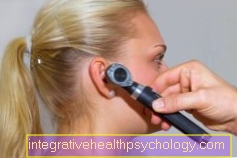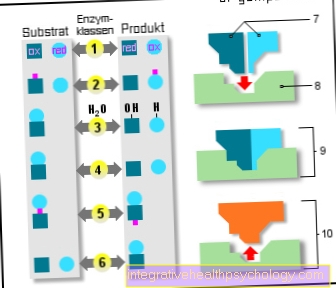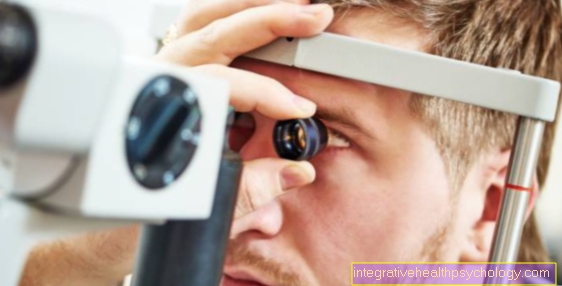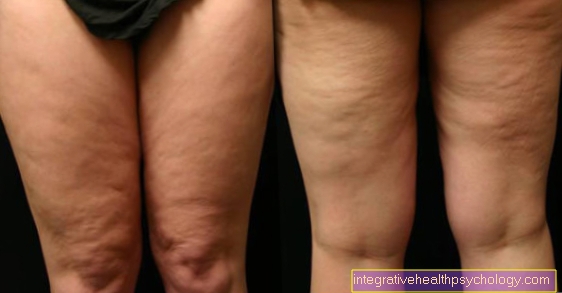Desogestrel
What is desogestrel?
Desogestrel is a hormonal contraceptive, so it is used to prevent unwanted pregnancy. It is a so-called "mini pill", a contraceptive pill with progestin as the only active ingredient. Estrogen-free pills like Desogestrel advertise effective contraception without the side effects of the classic estrogen-progestogen preparations (combination preparations).
At this point you should also deal with the "Cerazette" contraceptive method. This tablet form contains desogestrel and shows promise in preventing pregnancy. The most important information can be found under: Cerazette - the most important information at a glance

What is the mini pill?
The minipill is an estrogen-free contraceptive and contains progestin as the only active ingredient. It has advantages and disadvantages compared to the combination pill.
The minipill is recommended for women who cannot tolerate preparations containing estrogen. In principle, there are different generations with different active ingredients within the progestin preparations. Desogestrel is a third generation artificial progestin. The advantage of mini pills with desogestrel is the less strict administration time. There is a tolerance of around twelve hours. The safety of the mini pill with desogestrel is comparable to that of combination pills.
Levonorgestrel preparations, which are also pure progestin preparations, must always be taken at exactly the same time of day.
Further information on the topic: Mini pill
Who is desogestrel recommended for?
Since it is an estrogen-free preparation, desogestrel and other mini pills are used in women with estrogen intolerance. If headaches, menstrual problems, breast tenderness or other side effects occur when taking combination preparations, a switch to an estrogen-free preparation may be indicated.
Continue reading: estrogen
The minipill is also recommended for women with an increased risk of thrombosis, such as smokers. It is also suitable for women with blood clotting disorders, overweight, high blood pressure or with existing diabetes mellitus.
In contrast to the combination pill, the production of breast milk is not influenced by the minipill, and less active ingredient is absorbed by the infant through breast milk. The estrogen-free contraceptives can therefore also be taken while breastfeeding.
How does desogestrel work?
The mini pill with desogestrel is a pure progestin preparation, which means it does not contain any estrogen. Desogestrel has several contraceptive effects: It thickens the mucus in the cervix, which prevents sperm from entering the uterus. It also changes the structure of the lining of the uterus, which means that fertilized egg cells may not be able to implant. Desogestrel also suppresses ovulation: This additionally increases the safety of Desogestrel preparations compared to other estrogen-free preparations. Desogestrel is considered to be very safe, comparable to conventional combination products.
In addition, progestin is used in transsexual men to suppress menstrual bleeding if this is not done by testosterone treatment.
You might also be interested in: Structure of the uterine lining
What are the side effects of desogestrel?
Like any drug, desogestrel can have side effects.
Spotting, intermenstrual bleeding or cycle irregularities are very common when taking it. Headaches, water retention or weight gain, skin problems such as acne or hair loss, breast tenderness or a changed mood are also common. Occasionally, you may experience nausea and vomiting, vaginal infections or inflammation, menstrual pain, or allergic reactions with rash and itching.
The risk of thrombosis, the formation of a blood clot, is also increased when taking any type of birth control pill. Smokers in particular have an increased risk of thrombosis or pulmonary embolism.
Compared to combination preparations, however, the risk of thrombosis is lower with estrogen-free preparations such as desogestrel. At the first signs of a possible thrombosis such as pain and swelling of the calf or thigh, overheating of the extremities or superficial vein markings, treatment with desogestrel should be stopped immediately and a doctor should be consulted.
A doctor should also be consulted in the event of other side effects such as severe headaches, visual disturbances or depression. In rare cases, the use of desogestrel can lead to liver problems, liver inflammation or jaundice.
You might also be interested in: Thrombosis prophylaxis
Weight gain
Weight gain is considered a possible side effect of desogestrel. However, this does not occur with every user.
Whether weight gain occurs when taking desogestrel or other hormonal contraceptives is individual. For some, the pill leads to increased food intake via an increased appetite and weight increases. In addition, water retention is a common side effect, which can lead to weight gain. Patients who gain significant weight should consult their doctor. In general, an increase can be counteracted with a healthy, balanced diet and exercise. In some cases it may be necessary to switch to another contraceptive.
Further to: How healthy is your diet - the self-test
Influence on the libido
Desogestrel can also have an influence on libido. Women report sexual displeasure and improvement when switching to alternative contraceptives. The influence of the effects of progestin on the hormonal balance is held responsible.
So the pill can have an impact on the female libido. Women should point out the possible side effects to the attending physician with reduced sexual desire. Switching to a different contraceptive can help.
depressions
In the package inserts for the pill, a possible side effect is also mentioned as an influence on the mood up to and including the development of depression.
Studies speak of an increased occurrence of symptoms especially at the beginning of the intake. Mood swings do not have to occur in all women.
Changing the preparation can help; sometimes it is advisable to switch to alternative methods of contraception such as mechanical contraception using condoms.
Particular caution is required when taking St. John's wort. This is used for mild to moderate depression. The active ingredient accelerates the metabolism of contraceptives and reduces their effectiveness. This can lead to unwanted pregnancy.
Read on on the topic: Depression
Hair loss
In addition to skin problems such as acne, the pill can also cause hair loss. The reason for this can be the androgenic effects of progestins.
Desogestrel is usually a progestogen with a very low androgenic effect, so a switch from another progestogen preparation or combination preparation to desogestrel in the case of hair loss may be indicated. Even after stopping the pill, women sometimes complain of hair loss.
As a rule, the lost hair grows back as soon as the body has got used to the hormonal change. In the case of severe hair loss, a dermatologist should be consulted to be on the safe side, or a change of contraceptive should be discussed with the gynecologist.
You might also be interested in:
- Acne - This works best
- More reasons for hair loss
Risk of thrombosis
In general, the risk of thrombosis is increased for every woman who takes hormonal contraceptives.
The influence of the birth control pill on the metabolism of the so-called coagulation factors of the liver is held responsible for this. The risk of thrombosis with the minipill, however, is significantly lower than with combination products, which is why they are recommended for women with an increased risk.
This particularly includes women who smoke, have already suffered a thrombosis or have a positive family history. At the slightest sign of a possible thrombosis - feeling of tension, warmth or increase in the circumference of the affected extremity, superficial vein markings - those affected should definitely consult a doctor.
Find everything else on the topic: Blood clotting
Interactions
In general, there may be interactions when using several drugs.
There are also known interactions between desogestrel and other drugs. Therefore, a doctor or pharmacist should be consulted before taking any other medication.
Interactions are known, for example, for anti-epileptic drugs, barbiturates and St. John's wort. They can accelerate the breakdown of desogestrel and reduce the contraceptive effect. Corresponding interactions are also known with antibiotics, some antiviral agents or antifungal agents. Desogestrel can also affect the effectiveness of insulin and oral antidiabetic drugs.
When should desogestrel not be taken?
Desogestrel should not be taken if an intolerance to the active ingredient is known. Switching from another estrogen-free preparation can, but does not have to, eliminate its side effects.
In addition, desogestrel should not be taken if there is a thrombosis. Desogestrel preparations are also contraindicated in liver diseases with altered liver function and jaundice (jaundice). This also applies to certain types of breast cancer or any other sex hormone-dependent cancer. Unexplained vaginal bleeding is also a contraindication for the administration of desogestrel.
dosage
The use of desogestrel should be discussed with a doctor or pharmacist. Generally one tablet is taken every day.
Even if bleeding occurs, the intake must not be interrupted. It is important that the preparation is taken at the same time every day. Desogestrel-containing mini pills allow a certain tolerance of a maximum of twelve hours compared to levonorgestrel, but their safety is highest if there is a 24-hour period between taking two pills.
price
The price of preparations containing desogestrel fluctuates between different providers. Depending on the size of the pack, the price per pill varies between € 0.30 and over € 1.50, a pack for 3 months (three times 28 pills) costs around € 20.
Alcohol and desogestrel - are they compatible?
Basically, the contraceptive effect of the pill is not affected by the consumption of alcohol.
It becomes problematic when symptoms of mild alcohol intoxication occur due to the toxic effects of alcohol.This includes vomiting or diarrhea, for example. This may cause the hormones to be removed from contraceptives before they are metabolized by the body. This means that the contraceptive effect of desogestrel and other contraceptives may be reduced.
In this case, the use of a condom offers additional security.
Also read: Non-hormonal contraceptives
Alternatives to desogestrel
In addition to combination pills that contain progestogens and estrogens, there are a large number of pure progestin pills.
The conventional minipill contains the active ingredient levonorgestrel, but there is no time limit for taking it. The safety can be reduced under certain circumstances by an incorrect intake.
Alternative methods of contraception to pills are hormone patches, the vaginal ring, hormone injections or hormone implants. Hormone IUDs, which last three or five years depending on the model, are also considered an alternative to conventional birth control pills.
The suitable method of contraception should be selected in a detailed consultation with the gynecologist, as each method has advantages and disadvantages.
Further information on this topic can be found at: Hormonal contraceptives
Can I take it while breastfeeding?
Women who are breastfeeding should generally use non-hormonal birth control methods. After that, however, the mini pill is considered the method of choice.
Desogestrel can therefore also be used during breastfeeding. Small amounts of the active ingredient pass into breast milk, but no effects on the growth or development of the children were observed.
Compared to combination products, milk production is not affected by taking pure desogestrel products. It should be taken at the earliest six weeks after delivery. Breastfeeding mothers should consult their doctor carefully before taking any medicinal product.
Everything about: Breastfeeding





























